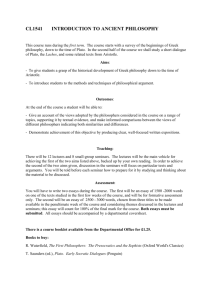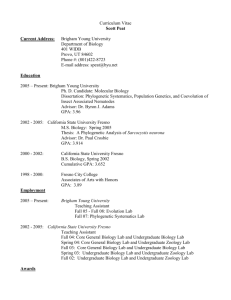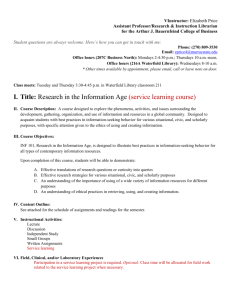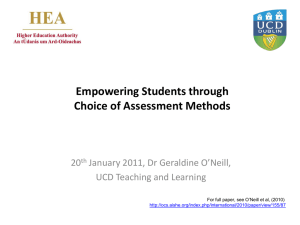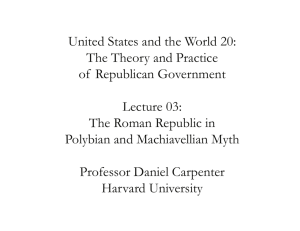Mary-Frances Williams, reviewing Robin Waterfield, Polybius. The
advertisement
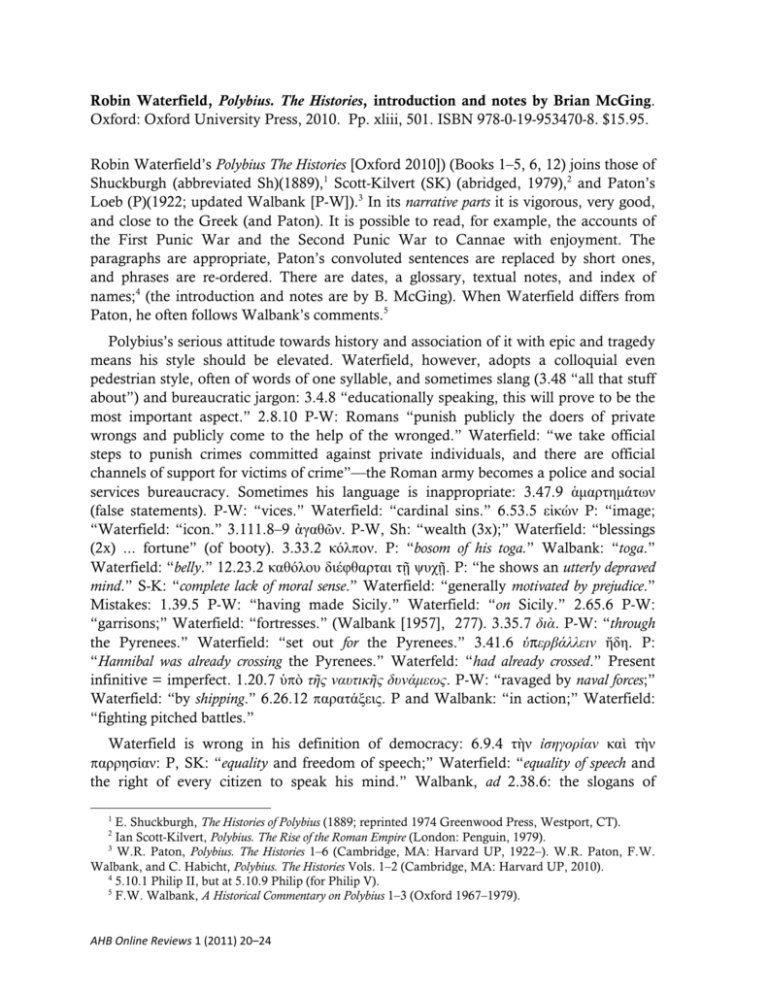
Robin Waterfield, Polybius. The Histories, introduction and notes by Brian McGing. Oxford: Oxford University Press, 2010. Pp. xliii, 501. ISBN 978-0-19-953470-8. $15.95. Robin Waterfield’s Polybius The Histories [Oxford 2010]) (Books 1–5, 6, 12) joins those of Shuckburgh (abbreviated Sh)(1889),1 Scott-Kilvert (SK) (abridged, 1979),2 and Paton’s Loeb (P)(1922; updated Walbank [P-W]).3 In its narrative parts it is vigorous, very good, and close to the Greek (and Paton). It is possible to read, for example, the accounts of the First Punic War and the Second Punic War to Cannae with enjoyment. The paragraphs are appropriate, Paton’s convoluted sentences are replaced by short ones, and phrases are re-ordered. There are dates, a glossary, textual notes, and index of names;4 (the introduction and notes are by B. McGing). When Waterfield differs from Paton, he often follows Walbank’s comments.5 Polybius’s serious attitude towards history and association of it with epic and tragedy means his style should be elevated. Waterfield, however, adopts a colloquial even pedestrian style, often of words of one syllable, and sometimes slang (3.48 “all that stuff about”) and bureaucratic jargon: 3.4.8 “educationally speaking, this will prove to be the most important aspect.” 2.8.10 P-W: Romans “punish publicly the doers of private wrongs and publicly come to the help of the wronged.” Waterfield: “we take official steps to punish crimes committed against private individuals, and there are official channels of support for victims of crime”—the Roman army becomes a police and social services bureaucracy. Sometimes his language is inappropriate: 3.47.9 ἁµαρτηµάτων (false statements). P-W: “vices.” Waterfield: “cardinal sins.” 6.53.5 εἰκών P: “image; “Waterfield: “icon.” 3.111.8–9 ἀγαθῶν. P-W, Sh: “wealth (3x);” Waterfield: “blessings (2x) ... fortune” (of booty). 3.33.2 κόλπον. P: “bosom of his toga.” Walbank: “toga.” Waterfield: “belly.” 12.23.2 καθόλου διέφθαρται τῇ ψυχῇ. P: “he shows an utterly depraved mind.” S-K: “complete lack of moral sense.” Waterfield: “generally motivated by prejudice.” Mistakes: 1.39.5 P-W: “having made Sicily.” Waterfield: “on Sicily.” 2.65.6 P-W: “garrisons;” Waterfield: “fortresses.” (Walbank [1957], 277). 3.35.7 διὰ. P-W: “through the Pyrenees.” Waterfield: “set out for the Pyrenees.” 3.41.6 ὑπερβάλλειν ἤδη. P: “Hannibal was already crossing the Pyrenees.” Waterfeld: “had already crossed.” Present infinitive = imperfect. 1.20.7 ὑπὸ τῆς ναυτικῆς δυνάµεως. P-W: “ravaged by naval forces;” Waterfield: “by shipping.” 6.26.12 παρατάξεις. P and Walbank: “in action;” Waterfield: “fighting pitched battles.” Waterfield is wrong in his definition of democracy: 6.9.4 τὴν ἰσηγορίαν καὶ τὴν παρρησίαν: P, SK: “equality and freedom of speech;” Waterfield: “equality of speech and the right of every citizen to speak his mind.” Walbank, ad 2.38.6: the slogans of 1 E. Shuckburgh, The Histories of Polybius (1889; reprinted 1974 Greenwood Press, Westport, CT). Ian Scott-Kilvert, Polybius. The Rise of the Roman Empire (London: Penguin, 1979). 3 W.R. Paton, Polybius. The Histories 1–6 (Cambridge, MA: Harvard UP, 1922–). W.R. Paton, F.W. Walbank, and C. Habicht, Polybius. The Histories Vols. 1–2 (Cambridge, MA: Harvard UP, 2010). 4 5.10.1 Philip II, but at 5.10.9 Philip (for Philip V). 5 F.W. Walbank, A Historical Commentary on Polybius 1–3 (Oxford 1967–1979). 2 AHB Online Reviews 1 (2011) 20–24 Mary-­‐Frances Williams on Robin Waterfield’s translation of Polybius democracy (usually τὴν ἰσονοµία καὶ παρρησία; ἰσηγορία Hdt. 5.66.1, 78), ἰσηγορία = “equality.” ἰσηγορία meaning “freedom of speech” was replaced by παρρησία with fifthcentury democracy. 6.9.5 τῆς ἰσηγορίας καὶ παρρησίας. P: “freedom and equality;” Waterfield: “equal and free speech.” The phrase is nonsensical: there is no equality of speech. Waterfield deletes the Achaean League’s great achievement, the unification of the Peloponnese (2.37.8–11; 2.38.9; 2.40.1–2; 4.1.7). 2.40.1–2 ὁµόνοιαν: P-W: “uniting all the Peloponnesian states;” Sh, SK: “union;” Waterfield: “concord.” 2.40.2 P-W: “project ... union;” Waterfield: “concord.” 2.42.6 τὴν κοινὴν ὁµόνοιαν. P, SK, Sh: “union;” Waterfield: “concord.” 2.38.9 συµφρονήσαντας. P-W: “union;” Waterfield: “cooperate.” 3.3.7 ὁµονοίας καὶ καταστάσεως: P-W: “unity and settled condition” of the Peloponnese.” Walbank: ὁµονοία is a state: “unity and settled condition.” Waterfield: “settlement of the Peloponnese and restoration of concord.” Waterfield ignores the federal union; his “concord” is like saying that Lincoln “saved the peace” or the Civil War was fought over “concord.” The Achaean League is another mixed constitution (23.12.8; Walbank [1957], 219) with Sparta, Carthage, Crete, and Rome. McGing (xvii) says that the League was less important than Macedon, but he fails to understand its political significance as a democratic federal state. Waterfield downplays its federal aspect: 4.7.1 “It was time for one of the Achaeans’ regular meetings;” P-W: “This being the time fixed by law for the meeting of their Federal Assembly.” 4.14.1 P-W: “the Achaean Federal Assembly held its regular general meeting.” Waterfield: “the Achaean assembly met for one of its regular sessions.” But the Achaeans had several assemblies. 2.54.3 Waterfield: “Achaeans were in assembly.” 2.37.11 P-W: “magistrates, senate, and courts;” Waterfield: “statesmen, council, and law courts.” 4.6.4, 7; 4.19.1 P-W: “the Achaean Strategus.” Waterfield: “the general of the Achaean League”— the highest elected official of the League (2.43.1–2; Walbank), but Waterfield says he was “appointed.” 2.43.7 P-W: “reestablishment ... of the federal and individual freedom of each state.” Waterfield: “guaranteeing every community its ancestral freedom, as a member of a free League.” 5.106.5 φιλελεύθεροι. P: (Spartans are) “fond of liberty;” Sh: “freedom.” Walbank: liberty (absence of tyranny). Waterfield: “do not like to be answerable to anyone.” 6.10.11 ἐλευθερίαν. P, SK: “liberty;” Sh, Walbank: “freedom.” Waterfield: “independence.” Freedom and liberty are not independence. 6.48.2 P: “freedom; Waterfield: “autonomy.” 6.48.5 P: “freedom; Waterfield: “autonomous.” 6.50.5 P: “liberty;” Waterfield: “autonomy.” 2.35.8 (of the Greeks) P-W, SK: “liberty.” Sh: “freedom.” Waterfield: “independence.” 2.44.4 P-W: “free;” Waterfield: “independence.” Polybius contrasts the freedom of Sparta with his dislike of the tyrant Nabis; also freedom with tyranny (2.44.4) and free men with slaves (6.33.1). 6.9.8 τὰς ἐλπίδας ἔχειν τοῦ ζῆν ἐπὶ τοῖς τῶν πέλας. P: The people “depend for their livelihood on the property of others;” Waterfield: “expected their daily needs to be met.” 6.9.5 πλέον ἔχειν τῶν πολλῶν. P: “aim at pre-eminence;” Waterfield: “want to get ahead of Page 21 Mary-­‐Frances Williams on Robin Waterfield’s translation of Polybius everyone else.” LSJ: πλέον ἔχειν + genitive: “to conquor.” 6.47.1, 4–5 ἔθη καὶ νόµοι. P: “customs and laws. Waterfield: “customs and traditions.” 6.17.7 P: “civil trials;” Waterfield: “commercial lawsuits.” Not just commercial trials: Walbank: δηµόσια ... ἐγκληµκάτα = “offences against the state.” Roman civil jurisdiction included criminal matters. 12.25k.2 πραγµατικωτάτους ἄνδρας. P: “most capable rulers.” Waterfield: “particularly pragmatic.” LSJ πραγµατικός: men of action. 12.28.2 οἱ πραγµατικοὶ. P: “it will be well with history when men of action undertake to write history.” Waterfield: “history will be fine either when men who have held public office take up history writing.” What about military men? 12.25h.6 P: “this quality can naturally only be found in those who have been through affairs themselves and have acquired this sort of historical knowledge.” Waterfield: “this vividness is most likely found only in writers who have taken up the writing of history after gaining direct experience in public life.” Polybius speaks of all experience (12.25h.4–6; 25i.7; 28a.6). 3.59.4 P-W: “men of action in Greece are relieved from the ambitions of a military or political career.” Waterfield: “men who are capable of being effective in the world have been freed of the obligation to devote themselves to warfare and statesmanship.” Effective is not the same as men of action. LSJ φιλοτιµία: ambition. The Roman conquest of Greece (not McGing’s “probably”) ended careers; not “obligations” from which they were “freed” but desired democratic offices which were no longer available. B. McGing (xxx–xxxi) says Polybius’s speeches are “outright invention” (though Polybius rejects made-up speeches [12.25a.3–25b.4; 12.25i.3–9]) because he could not have known Hannibal’s. McGing is unaware of Polybius’s use (3.20.5) of Sosilos (D. Roller, BNJ 176 = FGrH 176) and Silenos (Mary F. Williams, BNJ 175 = FGrH 175), Greek historians who accompanied Hannibal. Hannibal’s address at Zama (15.11) is based on Silenos (Walbank, [1979], 446), and the battle of Cannae (3.115–17) is partly from Silenos. Polybius praised Aristotle (12.5.4; 12.6.7–8; 12.6a.1; 12.7.2), who influenced him (Walbank, passim, and my “Polybius’ Historiography and Aristotle’s Poetics,” AHB 21 [2007], 1–64). Waterfield avoids standard Aristotelian terms: µεγαλοψυχίας (“magnaminity”);6 φῦναι (“by nature”);7 παράδοξον (“unexpected”) (Walbank, ad 1.1.4: Aristotle, Poet. 9, 1452a);8 τέλος (“object, goal”);9 θέαµα (“spectacle”);10 οἰκεῖον and ἴδιον “(proper to”);11 περιπετεία (reversal of fortune).12 He omits “bring before the eyes” 6 1.8.4; 1.64.5; 4.48.9; 4.27.10; 6.58 13. 6.48.4 Waterfield omits. 12.26a.3 Waterfield omits. 12.25c.2. 8 1.1.4; 1.2.1; 1.87.1; 2.35.8; 3.4.13. (History deals with the unexpected: 2.37.6; 2.35.5–10). 9 1.3.4–5; 2.43.7; 3.4.9, 12. History is telological (2.56.11). 10 1.1.6 θεαµάτων ἢ µαθηµάτων. P-W: “spectacles or studies;” Waterfield: “marvel or matter.” Thuc. 2.39.1 ἢ µαθήµατος ἢ θεάµατος “learning or observing.” 1.2.1; 6.44.6 Waterfield omits. 11 (Arist. Poetics 14.1453b7–11; 6.1450b.16–18; 13.1452b.33). 1.4.1; 2.35.5; 2.56.9; 2.61.3; 12.15.9; 12.25b.1; 6.10.2; 2.61.6 P: “he deprives us of what should follow and what is the special virtue of history, I mean praise and honourable mention of conduct noteworthy for its excellence.” Waterfield: “ that is where he stops without drawing any conclusions. He fails to assign praise or to comment favorably on the remarkable principles involved, when this is exactly what history is for.” 12 1.1.2; 1.13.1; 1.87.1; 2.56.6; 6.2.7; 6.3.1; 6.43.2. 7 Page 22 Mary-­‐Frances Williams on Robin Waterfield’s translation of Polybius (1.68.1; 2.35.8; 2.56.8; 3.3.6; 3.6.12; 3.109.9; Poetics 17.1455a22–26; Rhetoric 3.10.1410b33–6; 2.8.1386b6–8). Waterfield distorts Polybius’s historiography: 6.2.8 P: “what chiefly attracks and chiefly benefits students of history is ... the study of causes and the consequent power of choosing what is best in each case.” Waterfield: “Readers are simultaneously entertained and educated by an account of causes and by seeing people choose the better course in any given situation.” The ability to choose follows from understanding causes. Walbank: αἰτία is the constitution which shapes decisions in advance. 12.25i.9 P: “it is difficult to assign causes.” Waterfield: “these factors are, I think, hard to describe.” Walbank: αὐτολογεῖν = tracing causes. 12.25g.2 ἐµφαντικῶς P: “vividness.” Waterfield: “clarity.” Polybius thought vividness essential (12.25h.3–4; historical narrative should make the reader cry out [12.25h.5 Waterfield: “declare”]). 6.54.3 ὑπὲρ τῶν κοινῶν πραγµάτων χάριν ... ἐυκλείας. P: “the most important result is that the young men are thus inspired to endure every suffering for the public welfare in the hope of winning the glory that attends on brave men.” Waterfield: “the most important thing is that young men are inspired to heroic feats of endurance in order to gain the fame that accrues to the brave.” Waterfield omits the public good and causation; glory, not fame (also 6.55.3). 12.25b.4 παρασιωπῶν. P, SK: “passes over in silence.” Waterfield omits. (P: “But a writer who passes over in silence the speeches made and the causes of events ... destroys the peculiar virtue of history.”) Walbank: suppressing information. Waterfield speaks not of honorable men but those with scruples (4.30.4); not noble behavior but “remarkable principles” (2.61.6); not those who bear misfortune nobly but those who do not compromise their principles (6.2.6); not villainy but “hypocrisy” (4.27.3, 7); not magnanimity but “objectivity” (4.27.10); not deeds worthy of emulation but “inspirational” ones (5.90.5; 6.39.8; 6.55.3; 6.25.11); history does not encourage noble behavior but instead arouses emotion (6.53.9–10); young men are not excited to emulation of noble deeds but inspired to do well (6.39.8; 6.54.3); not unmanly men but sentimental ones (2.56.9); international law instead of universal morality (2.58.6; 2.8.12; 3.8.10; 4.6.11); not countries but public officials (3.31.3); not men who serve their countries but professional politicians (3.21.9–10); not the people, only statesmen; not unity but “concord;” not democratic laws but decrees (3.8.10); not equality but “equal speech;” military officers do a job, not their duty; officers don’t give orders;13 Roman soldiers (apparently with low self-esteem) require reassurance and encouragement from generals (5.25.5, 7; 3.108.2; 3.109.5–6; 3.44.11); criminality replaces impiety and tyranny (2.59.6; 3.31.5; 2.8.10); complacency replaces negligence (5.88.3); people are not terrified by tyrants but face difficulties,14 and are frightened by barbarism, not barbarians (3.3.5); men don’t read history to serve their country but to “attain their goals” (12.25i.8); Aetolians have “character traits,” not an unscrupulous policy (4.27.8); not “common intelligence of mankind,” just “ordinary purposes (6.5.2);” instead of 13 6.33.3; 6.34.6; 3.71.6–9; 6.35.8; 6.35.11, 12; 6.37.5; 6.41.2; 3.34.9; 3.64.11; 3.44.11–12; 6.33.1. 2.52.1 Waterfield: “Cleomenes’ victories had made things very difficult.” “terrify” is important for Polybius (2.56.10, 11; 3.18.4; 3.91.10). 14 Page 23 Mary-­‐Frances Williams on Robin Waterfield’s translation of Polybius humanity, “courtesy” (2.38.9); the distinction between public and private is effaced;15 not lies, just misleading or mistakes;16 instead of truth, “openness” (3.64.11); Peloponnesians are not naturally inclined to a civilized life, but have the “necessities” for it (5.106.4); mixed constitutions do not correct themselves through balance of powers, but “the state helps itself from its own resources” (6.18.6); history is a “job” (2.35.5; 2.61.1; 12.25b.1; “job” of the artist 12.25h.3); there is no purpose of history, just its completion (3.4.12); historians are “supposed to do” things, not have duties (12.7.1, 3; 1.1.3); and it is “the province of a historian” not to record noble actions but to “see the good side of things.”17 This is not Polybius, not his ideas, and not his outlook. In fact, it would make Polybius scream out loud, and it is, after all, his history. MARY FRANCES WILLIAMS INDEPENDENT SCHOLAR 15 3.31.10; 4.14.1; 6.2.5; 6.17.1; 6.56.8; 4.29.5; 6.46.9; 6.47.4; 3.4.7; 3.31.3; 6.48.3. 12.26d.6 P: “unveracious.” Waterfield: “misleading.” 12.7.1 P: “false statements.” Waterfield omits. 12.27.1 P: veracious.” Waterfield: “reliable.” 12.28.10 P: “false.” Waterfield: “wrong.” 12 28.12. P: “false statement.” Waterfield: “misrepresents.” 12.28a.8 P: “deceived.” Waterfield: “serious mistakes.” 12.4c.2 P: “inaccurate.” Waterfield: “inadequacy of Timaeus’ research.” 12.25i.5 P: “untrue.” Waterfield: “misleading.” 12.25h.2 P: “errors and misstatements.” Waterfield: “misleading errors.” 17 2.61.12 P: “blind ... to the most noble actions and those most worthy of an author’s attention, has not said a single word on the subject.” Waterfield: “ [Phylarchus] was simply incapable of seeing the good side of things, which should be the province of a historian.” 16 Page 24

